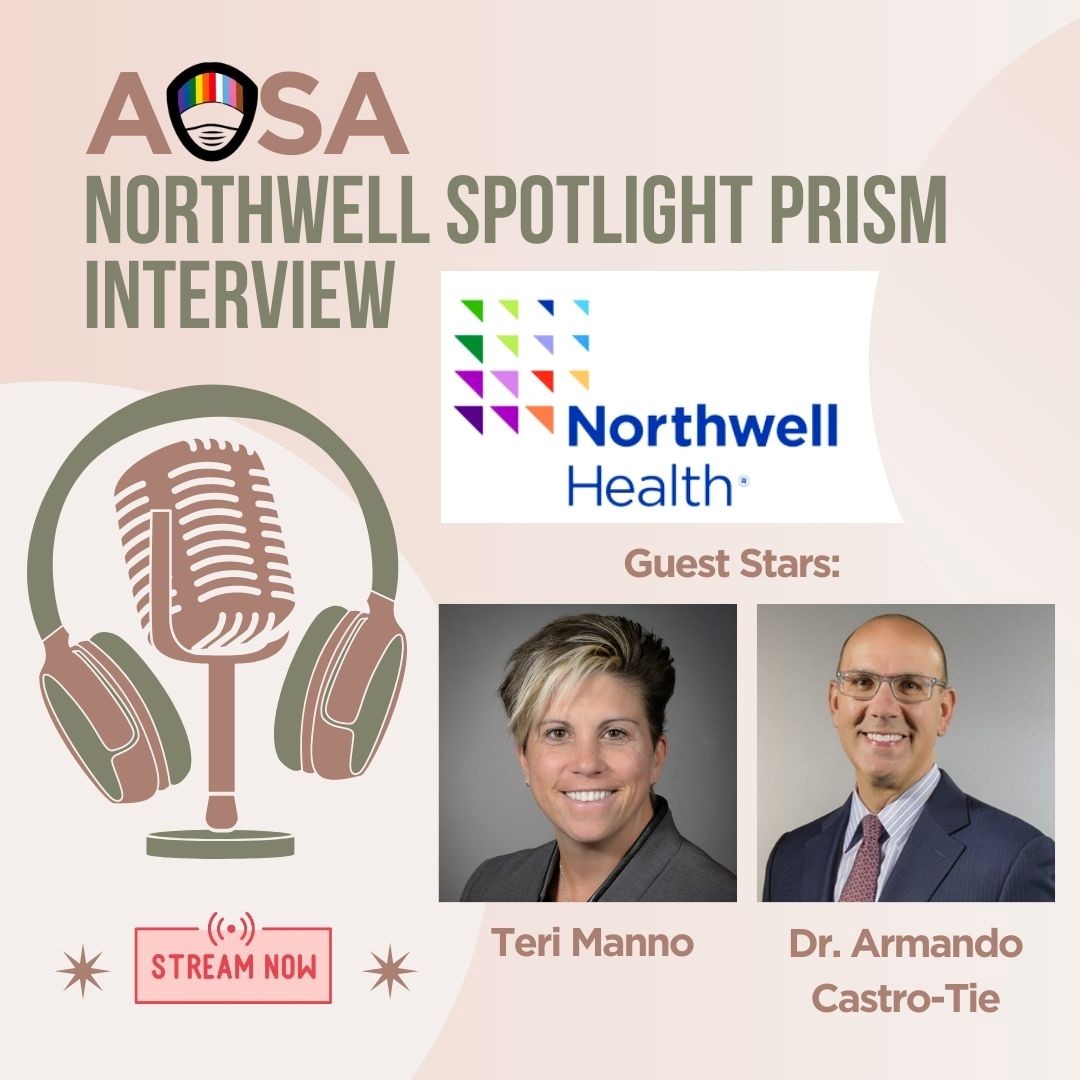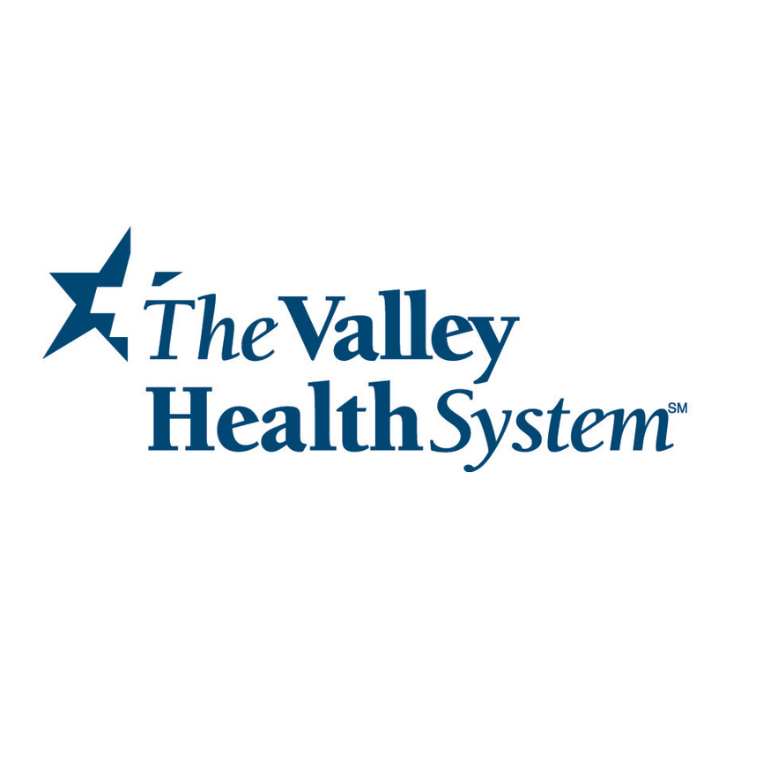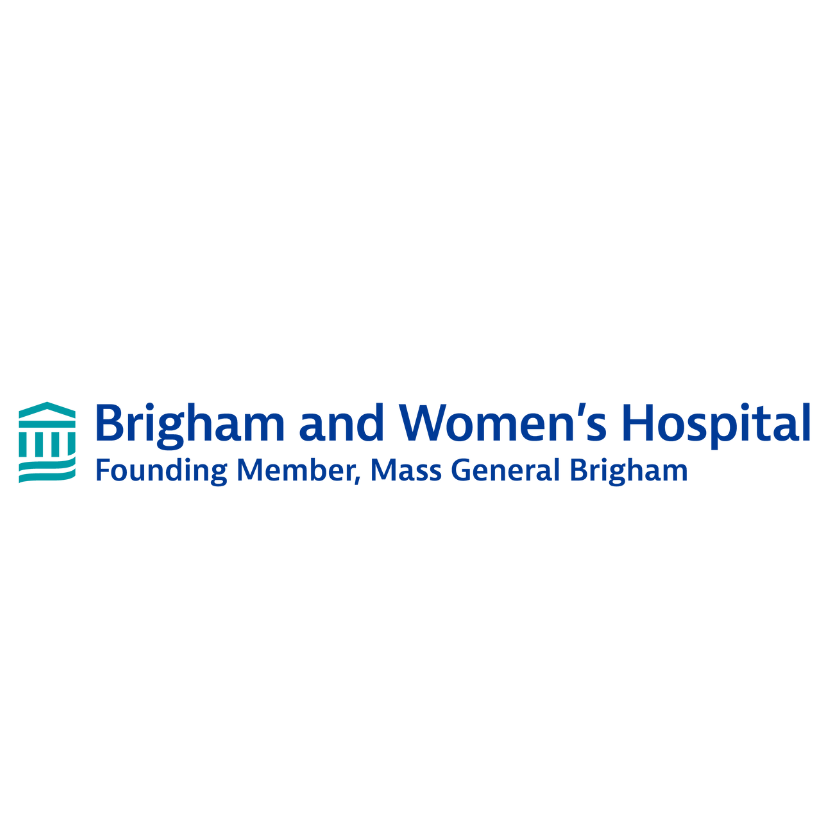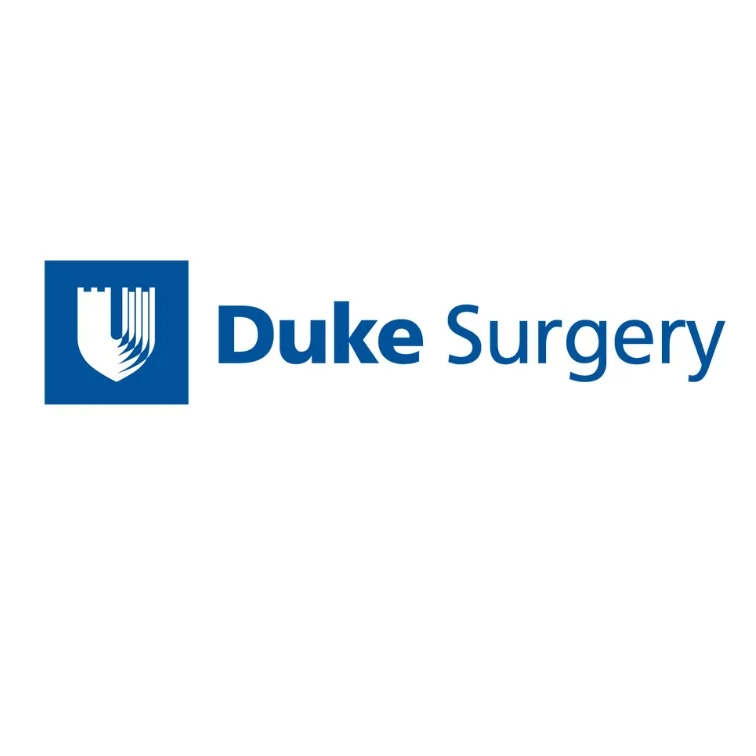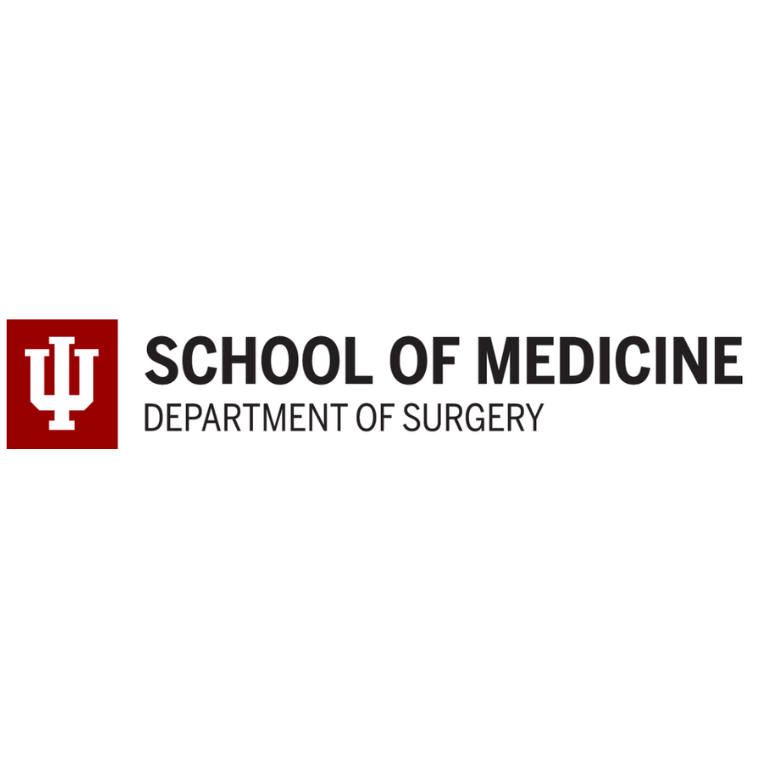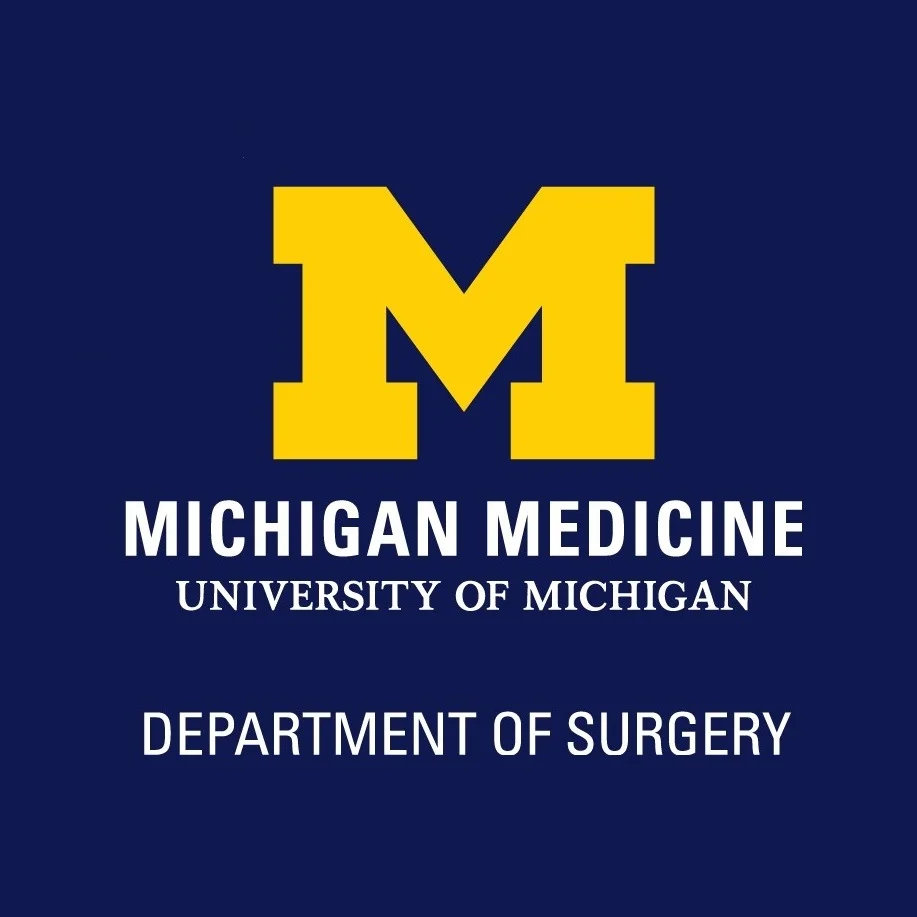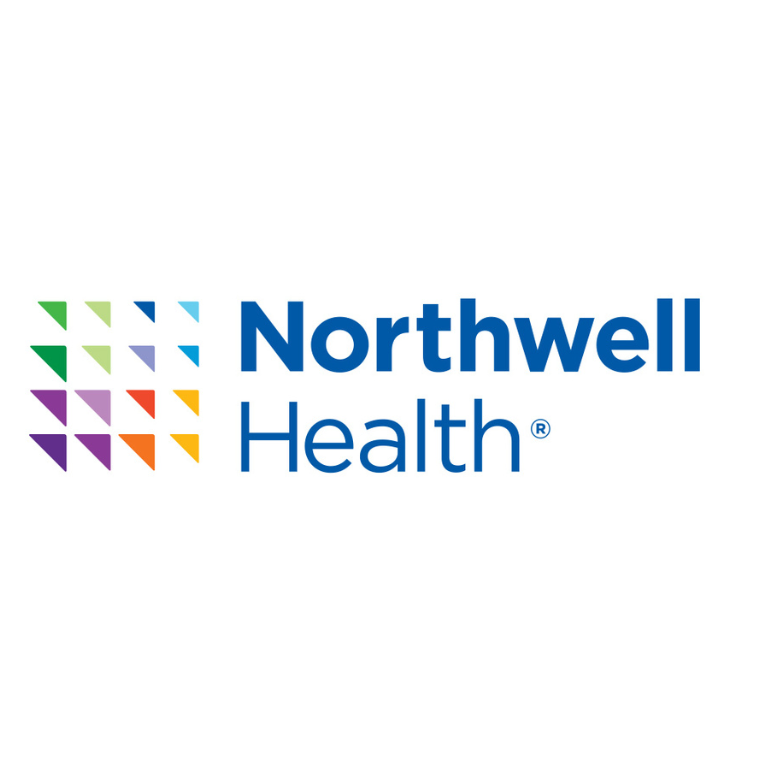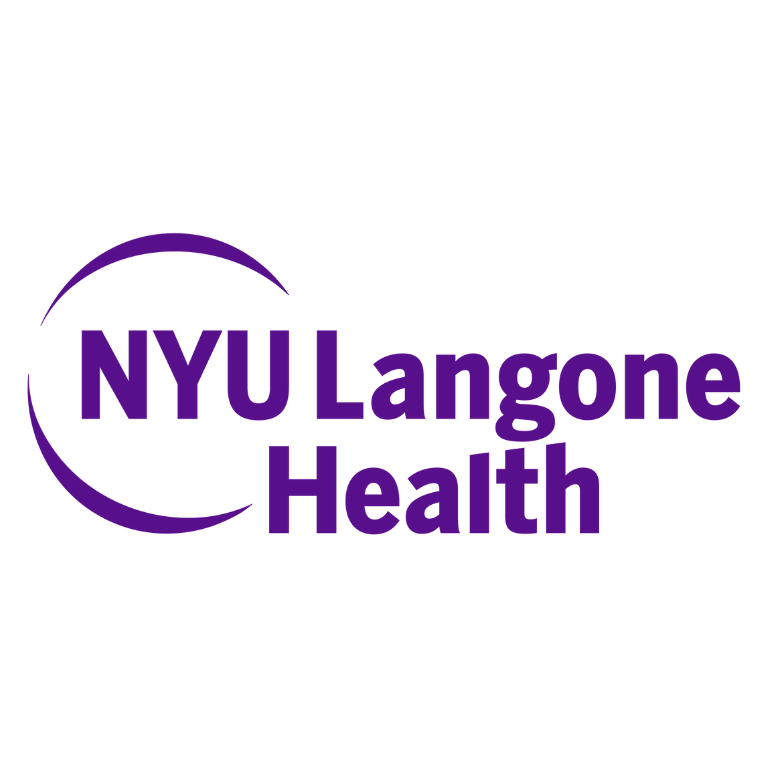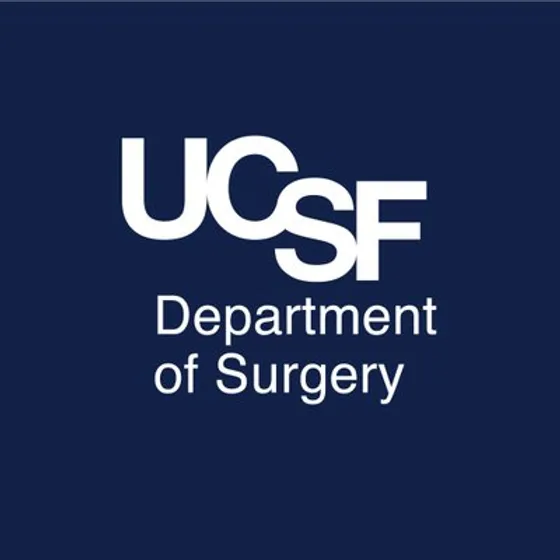Northwell PRISM Spotlight Interview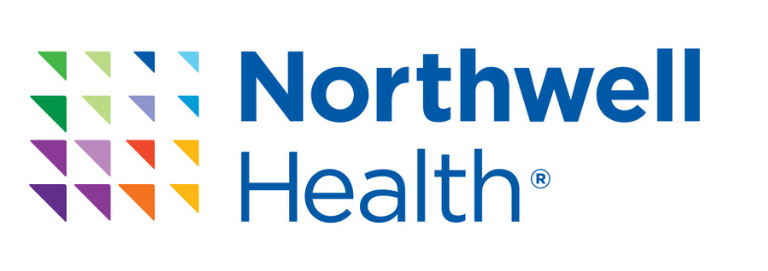 Join us for our October 2023 PRISM Spotlight Interview with Northwell HealthWatch on YouTube | See additional content on our YouTube Channel
Watch on YouTube | See additional content on our YouTube Channel
Northwell Health Prism Spotlight Interview
David Shapiro Good afternoon. Armando Castro-Tie Good afternoon. David Shapiro I'm going to ask you first to just introduce yourselves with your names, your titles and your institution. Teri Manno Hi, I'm Teri Manno. I'm the Vice President of Talent Acquisition for Northwell Health. Armando Castro-Tie I’m Armando Castro-Tie. I'm the Senior VP and Physician Executive for the Eastern region with Northwell. I'm also a Chair of surgery at South Shore University Hospital and one of the Vice Chairs for the surgery service line at Northwell. David Shapiro It’s great to meet you both. My name is Dave Shapiro. In addition to being one of the founding members of the Association of Out Surgeons and Allies, I’m the Vice President for medical affairs and Chief Medical Officer at Saint Francis Hospital in Hartford, CT. I'm a general surgeon. I did trauma and critical care, and I was the Chair of surgery here intermittently a couple of times and the Vice Chair and Chief Quality Officer, so it's nice to see people who are mode focused. First, if you would tell me, how did you hear about and learn about what AOSA was and why it was important to you? Why don't we start with Armando? How did you hear and learn about AOSA and why is it important to you? Armando Castro-Tie So Nikki [Nicole Goulet, President] and I worked at the same organization for a bit before I came to Northwell. She reached out to me early on in the process,[and] this was her brainchild for many years, as you know. And so like you, I was fortunate enough to be part of that initial group that launched this. I mean obviously she did and everybody else did all the heavy lifting, and I was just kind of along for the ride. But you know, it was exciting to see it come together. And really the speed with which it took off and how everybody kind of absorbed it--it just spoke to the need that we had for our organization. David Shapiro I love hearing that. And Teri, how did you get roped into things? Teri Manno So I work closely with Armando, Dr. Castro. I'm the Co-Chair of our Expressions BERG [business employee resource group] here at Northwell, which is for LGBTIQ+ members as well as our allies. And so Doctor Casto and I are very familiar with each other. Armando Castro-Tie Armando, please. Teri Manno Armando, sorry, physicians, it's a thing. As I'm an administrator, it's what I do. Armando and I got very close in that way, and when he told me about this, I'm like, absolutely. I'll do anything you ask me to do, need me to do, so that's why I'm here. David Shapiro I'm glad to hear that, especially in the world of talent acquisition, which a lot of people defer to being, “oh, they're just HR.” But really talent acquisition, they do exactly that. They acquire talent, and they want to make sure they're getting the right talent for their organization. So I appreciate that, and I'm glad you're both here. I'll start with some general questions. What does the concept of DEI mean to each of you, and I say this with tongue in cheek, because I think a lot of people understand DEI to mean: “Oh, we're gonna be aware, or we're gonna have a DEI committee.” When really it's a lot more than that. Tell me what you think, Teri. Let's start with you. What does the concept of DEI mean to you? Teri Manno So because I am in talent acquisition and just in general, simply because of my lifestyle and how I was raised and grew up, to me diversity, equity and inclusion always needs to include belonging, right? And to me, what it means is going into communities that may not have the opportunities that others have been afforded, and going into those communities purposefully so we can bring people to the bedside that look like the patients we serve. It's not just an initiative. Our recruiters go out into those neighborhoods. They grew up there. They live there. I have a very diverse recruitment team. Because of who I am and who I am in the health system, I have all my recruiters going out to all the events to make sure people understand: look, look at me, I'm out, and I'm a Vice President at Northwell. We accept, and we include, and we belong. So giving trainings, teaching people about pronouns and how to use them, those are the things that need to happen as opposed to what we do on paper. We actually have to live it. So to me, that's what it means, and I try to get my recruits to do the same thing. David Shapiro Glad to hear it. Armando? Armando Castro-Tie Yeah, exactly. And just so you know, Teri mentioned belonging. So a lot of our DEI efforts are now termed equity, diversity, inclusion, and belonging. And you’re right, Dave, it's not just about awareness. Thats just the beginning. It's taking action. You know what Teri’s team does takes action. Our BERG is incredibly active. It takes action in bringing people in. When we launched AOSA and were looking for sponsors, it literally took one e-mail to my service line Chair, and he said, “Yep, do it. It’s important for us.” And being a part of this organization as an out man in a senior leadership position, I'm not alone. In the senior and executive level, there are several allies and individuals with whom we collaborate and with whom we identify. Because for us at Northwell, it's not just about making people comfortable enough to fit in because fitting in means contorting yourself to something. We want people to belong and feel like they want to be here. And we walk the walk. I think you'd be hard pressed to find somebody in our organization that doesn't feel that. David Shapiro I'm glad to hear that, and that really makes sense. The word belonging really resonates with me. Having been in organizations that I didn't feel like I belonged, and now I work for a faith-based organization and I was raised Jewish, not in a Jewish organization. I'm part of the LGBT community, and I'm in a faith-based organization that doesn't seem on the outside to look that way. But then when you peel away a couple layers, you see our executive leadership team has three members of it that are LGBT, and it makes me feel like I belong, so I appreciate that. Why is it important to go outside of your organization and not just be in Northwell and say we're diverse, we're strong, we make people belong, but really go outside and demonstrate that? Why become a PRISM member of AOSA? Why is it important to go outside of your organization and demonstrate diversity? Why become a PRISM member of AOSA? Armando Castro-Tie We're the largest healthcare provider in the state of New York and almost in the Northeast. I think we've got a responsibility to lead the charge and to act by modeling what inclusivity and belonging and really fostering that kind of environment looks like. And it's great to see that we're not the only large organization that does it. So it's a matter of principle for us, and we lead by example. I was a program director for 16 years, and I feel that mentorship and really projecting the best that you are and the best that you offer is a responsibility that we all take very, very seriously. David Shapiro Glad to hear that and I'm going to move to Teri for a moment because in talent acquisition, you don't directly relate to the residency side of things or the medical students, but you do deal with the people who recruit those residents and medical students and other learners and trainees. From your perspective, when we have a world that allows us to ask if you're willing to share your ethnicity or other things, but yet the LGBT components have not been added to applications yet, any thoughts on that?
What are your thoughts on how to include LGBT components on applications and patient records? Teri Manno So we're working towards that. You know, I think one of the things that because we are a healthcare organization, we have to make sure that the patient facing side—that the patients feel included. And so we have worked very diligently with the BERG and of course with our leadership across the organization to change the verbiage inside of some of the medical records in the charts. For simple things like a birth certificate to say parent instead of, father and mother, to allow for those things. And so all of those things have been put into play. They actually just got launched in addition to all the benefits, the specific benefits that are geared towards our community. We need IVF in the lesbian community. We need that, and so those are now benefits for our team members--adoption, things like that. And so, you know, to me it's important. All of these things that we do need to be reflected in the patient. Inside of our applications, we have transgender communities coming in and teaching our recruiters how to speak, how to make people feel comfortable. At some point in time, everything needs to change. We need to change. We need to black out names because people have unconscious bias about foreign sounding names. And so all of these things have to be reshaped, because we don't want people to have an unconscious bias towards it, but we're working towards those things. David Shapiro I love hearing that. There’s a great paper last year in November that I wrote about being a beacon for people in that world, in medical students, learners of all types. And I really believe that one of the most important things I can do is wear my pronouns on my lapel. Of course, it's not on me today, but usually I have one of these pins but I usually give them away often. But I have so many pins and things that I share with people that I lose out on having any more to use, but I think it really makes it a statement when you can wear your pin, not just proudly, but you wear your pin so the others go: “I can talk to that person. I can feel comfortable with them.” It matters so much. Armando Castro-Tie I was just going to say too, going back to your previous question, I think why it was so important for us. You know, we also have a medical school, right? The Zucker School of Medicine, and we have a faculty council, and we have a mentorship program for our LGBTQIA students which works with our BERG. For us, for me as an educator, as a recovering program director to be in education and making sure that it's not just for our patients, it's important obviously, but [also] for our workforce and for our trainees. And that’s been really, really impactful. So us being able to say, “hey, listen, we're sponsoring this organization.” Yes, it's just surgeons, but that speaks volumes. When I participate in residency interviews, I wear my rainbow pin. Because like you said, when people see that they—you know, it's just a matter of being comfortable. David Shapiro Yeah, I wanna make sure that people coming into my program, if they don't get the message all day, they get the message when they're with me. Because if I can be that messenger, I will. And having been through a process where I was applying to residency in 2007, and I interviewed at a program, not in New York and not in Connecticut, where I had an experience of someone telling me that certain types of people were not welcome there, I left the interview, and I was called later saying you never step out of an interview. I said, “well, I'm not going tolerate that kind of behavior because it's just wrong.” I also have experienced some residents who've come to our program to interview. I should say resident candidates have come to interview and said to me, “yeah, you know I was at one place and they told me they didn't want to deal with all the drama of being a trans man.” And I said, “well, that's just blatantly #1 disgusting, #2 it's blatantly discriminatory.” And they said, “I know, but I don't feel like making a ruckus about it.” And I said, “well, I hope that you'll tell your colleagues and friends, the people that you know who are perhaps trans and applying to surgery.” And that person said to me, “there aren't any others.” And my goal is to make sure that people know there are. There are people in surgery who are there in the LGBTQIA plus community, and make sure that you remember that the allies in AOSA stands for surgical allies as well. We want the non-surgeons to be present and included. Let me ask you a little bit more about residency and medical student side of things. I know that the ACGME and the ERAS applications don't allow us to inquire about [it] yet, or don't have an option to inquire about gender identity or sexual identity or orientation, but are you doing anything to make sure people know that it's a safe place, other than just wearing a pin? What actions are you taking to assure that applicants know that Northwell is a safe place to work and train? Armando Castro-Tie Yeah, I can speak to that. So yes, when I have the opportunity to speak with the residents or medical students [who] are applying, I definitely share all of the programs and all of the initiatives that Northwell has, not just within surgery, but in the enterprise for all underrepresented groups. So I don't want to specify anything because I don't want to make them feel uncomfortable either, but I do think that it's an important message to speak about the BERGs, to speak about how involved we are with the medical school, at the department level, at the enterprise level. You're right, we can't yet, but we do it in subtle ways, but maybe not so subtle ways. And again, within our department, it's a very comfortable place, and I know that I'm not the only one. I know that there are many allies in my department who carry that torch as well. David Shapiro That's comforting to hear as well, but there's a lot of places out there that don't have that comfort. How about some advice for them, and not just become a member of AOSA and a supportive member, but what advice would you give them about changing their outlook to meet the next century and beyond? What advice would you give to other institutions? Teri Manno For us, I think one of the things is ensuring that people feel comfortable. To your point, it's not just about the pins. So whenever I'm talking to someone who I’m not--obviously we don't wear rainbow flags on our foreheads, I usually say, “Hi, I'm Teri Manno. My pronouns are she and her.” Most of the time, it's a gateway into a conversation, because most people understand why I'm doing that, and it gives a comfort level. I’m they/them. It gives us an opportunity, and I think that’s what I would suggest to others. You have to take baby steps. A lot of us have pronouns in our signatures simply because we want to encourage whoever we're emailing that this is a safe space for that. You can be whoever you want to be. Sometimes it's just the baby steps, even just that signature line is the start. And having people identify and introduce themselves in that way is the second piece of that. If they're comfortable with it to begin, that's what I would suggest. Armando Castro-Tie Yeah, I agree, and be vulnerable. You know, it's sort of this mix of being vulnerable and being bold. I have no problem that when I'm speaking and, you know, to Teri's point about Zoom, we all still are doing all the residency interviews via Zoom; have your pronouns on there. So it's the little things, but I have zero qualms about speaking about my family and my husband and my adopted children. And it's being vulnerable like that, I think opens so many opportunities. For me, if you’re not bold and you're not vulnerable [in] that way, as an organization, you're missing out on bringing in people that are incredibly talented. You’re really eliminating a huge swath of the population that are talented, that maybe are a great addition to our team. This isn't fringe thinking anymore, and I think people just need to kind of move away from that. David Shapiro You took the words out of my mouth. I was gonna say that, you know, when you talk about basic equity and basic concepts--really being able to share your life with your colleagues is important. It may be personal, but when everyone else talks about their kids, I want to be able to say about mine as well. I want to talk about that sort of thing without people going “ohh, something’s new.” Instead just, you know, look at the baby pictures or look at the dog pictures, cause that's what a lot of us do. But I think it's very important that you have that belonging and that really that concept of advanced understanding of what equity really is. It’s really just basic equity, being able to share your experience and then attract others in doing it. Couple of strange questions about Northwell. Are you an Epic house? Armando Castro-Tie In 523 days, I think. We're using Altera, Allscripts to summarize. David Shapiro So having been an Epic user for a bunch of years now, I know that they have an organ inventory, they do use pronouns, they have secondary names, and you can put parent, and you can put any categories you want. It's very customizable that way, which I found to be very useful. The biggest barrier to doing it is just that the people there are learning how to use it the proper way and speak the right words. How to leverage Epic to be more inclusive for LGBTQ+ patients? Armando Castro-Tie I’m on several of the work groups and the advisory groups for Epic, and tt's a huge runway for our launch. But in every single meeting each day day, and I just came off one today, before this meeting, there is some mention of making sure that equity and that language and that awareness is baked in to everything. So again to me that just speaks to the commitment that our organization has. Perfunctory is for posers, and we don't do perfunctory, we do it right. And it's really refreshing to see that. I've been here four and half years—I have been at a couple of other health systems, and it’s the best decision I've ever made. I've never been happier in my career, never been happier with the team that I work with and collaborate with, and that’s in no small part to just me feeling so comfortable here and so myself and really belonging here—as corny as that sounds, seeing that we’re talking [about it], but I really do feel it. So you feel like you blend. David Shapiro That’s wonderful. It’s satisfying to hear that [for] others. I’m very satisfied in my position and where I am and what I'm doing. And I feel like I can bring my other half. He comes to our galas and other things without people doing the whispering behind—that’s not necessary. The Bishop sometimes does, but we won't have a conversation about that. That said, I'll ask a couple of other small little questions, things like challenges. Have you been challenged in this endeavor, I mean not just becoming a member of AOSA and a supporter, but has anyone ever said to you: “hold on do we really want to go that far?” Either of you? What challenges (if any) have you faced while supporting diversity, equity and inclusion in surgery? Teri Manno I've never experienced any type of roadblock. I've been with Northwell for 16 years. I haven't experienced any roadblocks to me. It's normalizing something that is completely normal and confronting it in that way. I don't define myself by who I sleep with. I define myself by my integrity and my credibility and who I am as a person. If I can live inside that truth, I should live inside the truth of who I'm married to. So I think it's just a normalization of things. I have never in my entire career ever encountered--yes have I encountered people who are ignorant to it, 100%. But then you face those individuals, and say I'm just--you try to educate them in the most sensitive way possible. But that’s the only, and those were very rare too. David Shapiro And it must be satisfying to have that kind of organization behind you to do that. Teri Manno 100%. Armando Castro-Tie 100%. Teri Manno I’ve been open and out the entire time I've been here. I've never once had anyone look at me any differently, and it has not inhibited my rise. I started as a manager, I’m now Vice President, so it is the least thing that people talk about me, other than my life stories ‘cause I always have really good life stories. Armando Castro-Tie So it’s just a really funny story about that cause I agree--nothing. I recently finally changed all of my names appropriately, which is, you know, kind of an HR nightmare to do, but including my signature. And people actually said, “so you finally put your husband's name with your name, right?” So yeah, people just kind of knew, and it was very cool. David Shapiro That's incredible. It's great to have met you both--last thoughts or comments before we go?
Final thoughts and comments? Armando Castro-Tie Well, we thank you for the opportunity to do this. I called immediately when we were offered do this. I'm like, I know exactly who I'm going to call, and she didn't hesitate. Because I really do feel strongly. I'm passionate about my identity, I'm passionate about working for this organization, and I'm passionate about what we represent. I was so proud that, you know, we took the charge, we really made that commitment and really put literally our money where our mouth is. The work that Teri does, and her team does, in sort of expanding that pool so successfully, it just speaks volumes. We're grateful for the selfishness. David Shapiro So, I can't steal Teri away from you then. Armando Castro-Tie Absolutely not. Not even close. Teri Manno You know, for me, with the world that exists now, where the norm is, it's more socially acceptable to hate. It's more socially acceptable to be biased towards other individuals. It's actually celebrated, so these types of things are critically important now to ensure that the message is getting out there. And now we're saying, “We’re here, we're not going anywhere. And by the way, look at the army we have with us.” And I think that's probably the most important thing at this moment, so I'm grateful to be given this opportunity. David Shapiro I appreciate it. So I'll leave you with just a reminder for those folks who are going to see this later that the mission statement of the Association of Out Surgeons and Allies is that we're an organization of LGBTQ+ surgeons and allies that promotes acceptance, inclusion, and equity in the surgical specialties to further learner engagement, support individual clinicians and researchers, and build a community. We also intend to create a space for LGBTQ+ surgeons and trainees that promotes a dignified and successful surgical career without stigma, judgment or discrimination. We aim to achieve this through a combination of outreach, education, mentorship, and professional development, and I think you two just did all that in 1/2 an hour, so I really appreciate it. Be well. Have a great experience, and thank you for being really wonderful advocates for the community. Teri Manno Thank you. Thank you for the opportunity. Armando Castro-Tie Thank you so much. Take care. <END TRANSCRIPT> |

